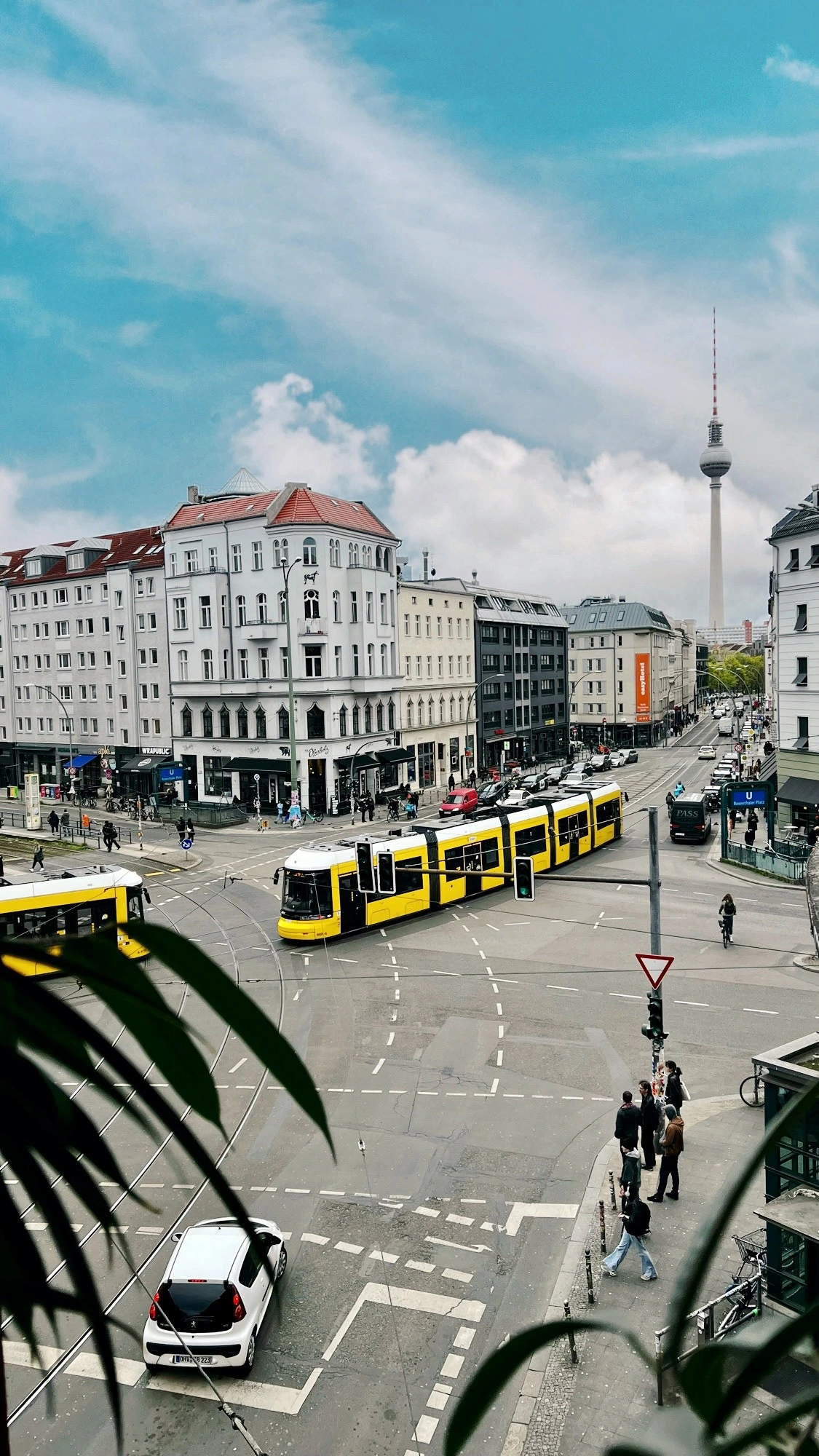Öffnungszeiten
Montag Donnerstag
10:00 bis 18:30 Uhr
Freitag
10:00 bis 17:30 Uhr
Kontaktangaben
Torstraße 125
10119 Berlin
Telefon: 030 – 250 980 68
Mobil: 0178- 728 32 44
E-mail
Verwandle deinen Sprachkurs in ein unvergessliches Erlebnis bei der DAS Akademie (Deutsche Akademie für Sprachen). Vom ersten Tag an legen wir den Schwerpunkt auf aktives Sprechen. Durch den Einsatz moderner Methoden und einen kommunikationsorientierten Unterrichtsansatz finden wir die ideale Balance zwischen Theorie und Praxis, um gemeinsam an deinen Zielen zu arbeiten. Unsere Sprachschule, zentral gelegen am Rosenthaler Platz in Berlin, bietet eine entspannte Lernatmosphäre, kleine Kursgruppen und hoch engagierte Lehrkräfte. Lass dich von uns auf deiner spannenden Reise des Spracherwerbs begleiten – und das mit Begeisterung und Erfolg.
Über 25 Jahre Sprachexpertise. Tausende erfolgreiche Schüler*innen aus 60+ Nationen. Dein Erfolg ist bei uns garantiert.
Im Herzen Berlins, deine Sprachschule direkt am pulsierenden Rosenthaler Platz. Kultur, Nightlife und Sehenswürdigkeiten gleich vor der Tür. Lerne da, wo das Leben spielt.
Dynamisch, praxisnah, individuell. Unser Motto: Sprechen, Sprechen, Sprechen. Dein Lernerfolg, unser Antrieb.
Akademisch ausgebildet, leidenschaftlich engagiert. Unsere Lehrkräfte sind mehr als Sprachvermittler – sie sind deine persönlichen Begleiter zum Spracherfolg.



In der DAS Akademie, deiner zentral gelegenen Sprachschule in Berlin, erwarten dich maßgeschneiderte Sprachkurse, die sich nahtlos in deinen Alltag einfügen. Ob du einen intensiven Deutschkurs anstrebst, abends Englisch lernen möchtest oder individuellen Unterricht in Spanisch oder Türkisch suchst – wir haben die perfekte Lösung für deine sprachlichen Ziele.

Wir haben genau den richtigen Deutschkurs für dich:
Und das Beste: All unsere Deutschkurse sind auch online verfügbar. So bleibst du, wo auch immer du bist, flexibel im Lernen.
Unsere Englischkurs-Angebote im Überblick:
Und das Beste daran: All unsere Englischkurse sind ebenfalls online verfügbar, sodass du flexibel bleibst, egal wo du dich aufhältst.
Wir haben genau den richtigen Spanischkurs für dich:
Und das Beste daran: All unsere Englischkurse sind ebenfalls online verfügbar, sodass du flexibel bleibst, egal wo du dich aufhältst.
Unsere Türkischkurs-Angebote für dich:
Auch unsere Türkischkurse stehen dir online zur Verfügung, sodass du jederzeit und überall flexibel lernen kannst.
Für unsere jüngsten Sprachschüler bieten wir maßgeschneiderten Einzelunterricht in der Sprache ihrer Wahl an.
Wenn Deutsch das Ziel ist, ergänzt unsere innovative Selbstlernplattform MintiCity den Einzelunterricht perfekt.
Mit einer herausragenden Durchschnittsbewertung sind wir stolz darauf, unseren Schüler*innen eine exzellente Lernerfahrung zu bieten. Aber hören Sie nicht nur auf uns, lesen Sie, was unsere Teilnehmer zu sagen haben!
Die hier dargestellten Rezensionen wurden unverändert aus dem Bewertungssystem von Google übernommen. Rezensionen werden weder von uns noch von Google überprüft. Google sucht aber gezielt nach gefälschten Inhalten, um sie zu entfernen.
Nicht nur im Unterricht, sondern auch drumherum sorgen wir für einen reibungslosen Einstieg. Vom Sprachvisum bis zur Prüfungsvorbereitung – wir sind an deiner Seite.
Als international anerkannte Sprachschule unterstützen wir unsere Schüler*innen aktiv bei der Beantragung eines Sprachvisums.

Fragen? Wir sind für dich da und beraten dich gerne persönlich. Finden wir gemeinsam deinen idealen Kurs – vielleicht sogar bei einem Kaffee?

Unser kostenloser Einstufungstest, entwickelt aus jahrelanger internationaler Erfahrung, sorgt dafür, dass du genau dort startest, wo du am meisten lernen kannst.

Starte jetzt durch – mit der DAS Akademie! Buche deinen Kurs und erlebe, wie motivierend und effektiv ein Sprachkurs sein kann. Wir freuen uns darauf, dich beim Erreichen deiner Sprachziele zu begleiten!
Montag Donnerstag
10:00 bis 18:30 Uhr
Freitag
10:00 bis 17:30 Uhr
Torstraße 125
10119 Berlin
Telefon: 030 – 250 980 68
Mobil: 0178- 728 32 44
E-mail
